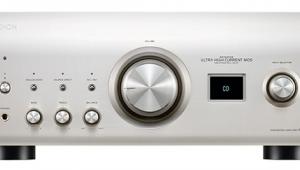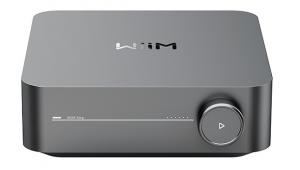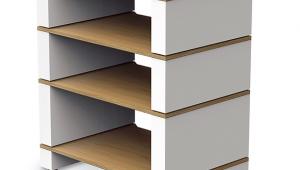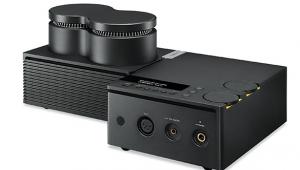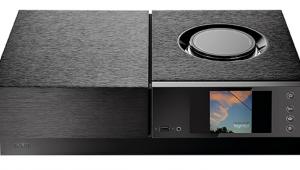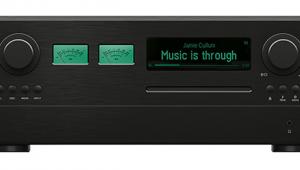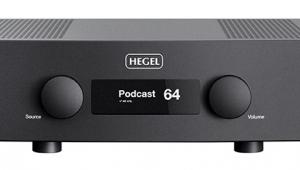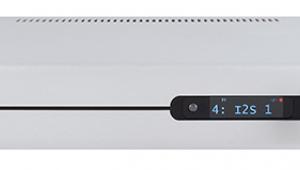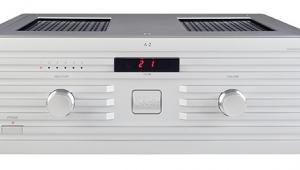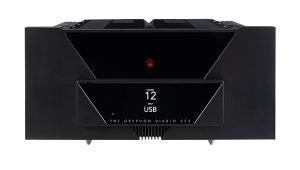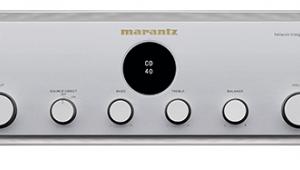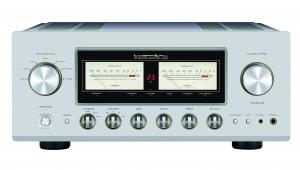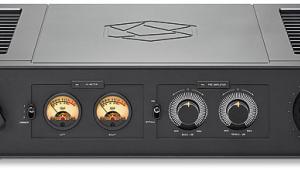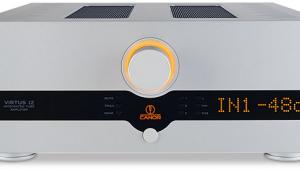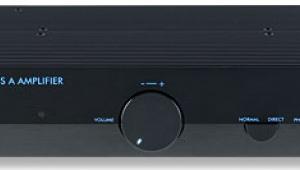Darttzeel Cth 8550 (£16,500 Line Only)
This way madness lies. Or so you’d think if you buy hook, line and sinker into the mythology that has grown up around the Swiss darTZeel brand. And yet our Movers & Shakers feature in the March ’09 issue illustrated that darTZeel partners Hervé Delétraz and Serge Roch are nothing if not methodical in their approach to amplifier design. Their goal is to keep the audio path as straight and simple as possible, avoiding input/output switching and even using an optically-coupled rotary encoder for volume rather than a conventional potentiometer.
Moreover the new CTH-8550 is no freaky audiophile amp with insufficient puff to drive a super-sensitive horn before cashing in its chips. No sir. In practice the CTH-8550 is a massively capable amplifier, offering a full 250 stereo watts into 8ohm and over 20A of clean current under dynamic conditions [see Lab Report]. Meatier even than Krell’s S-300i [HFN, Feb ’09] darTZeel’s new baby is also rather costlier at £16,500 (line only) or £17,500 and £18,250 with either MC or MM and MC phono options installed.
THE PLEASURE DOME
Of course, darTZeel does have an eccentric sense of humour, which is why the aforementioned knob is referred to as the ‘Pleasure Control’. Its NHB-18NS preamplifier has another hefty control called the ‘Enjoyment Source’, replaced in this integrated amp by a row of ball-bearing push buttons for the nine possible inputs. Naturally, these do not ‘switch’ the inputs by logic or relay but ‘enable’ them via a series of LDRs (light dependent resistors)...
In another departure, the CTH-8550 is configured through an entirely proprietary menu, the yellow display running to some 50 pages of options covering the name, input level, balance and mono/stereo/bypass mode of the selected source. Every CTH-8550 has a USB key for its owner (so you have some small satisfaction in knowing that a stolen darTZeel is useful only as a doorstop) and an internal clock for its CPU that also permits the amp to function as a luxury alarm. If you really want one of these in the bedroom then I’d plump for the sober black livery instead of this eye-watering red and gold. Regardless of colour, the standard of machining and finish is simply superb.
A GOLDEN SOUND
DarTZeel’s XLR inputs require a source with balanced outputs and Krell’s Evolution 505 [HFN, May ’07] is a perfect partner – a CD/SACD spinner with a wonderfully disciplined and coherent sound. To hear the darTZeel at its very best you should avoid lugubrious sounding front-ends, for any colour at the input tends to taint the inherently natural and easy-going magic of the amplifier itself. The 8550’s sound is at once massive but contained, free-sprited and yet ordered, a roller-coaster ride of thrilling you-are-there emotion. Perilously close to the edge it retains sufficient security that your musical carriage never tips off the rails.
The faintly bizarre Seven Lives Many Faces from Enigma [EMI 22712424] is about as digitised a composition as you’ll encounter (much of it was recorded and mastered at the ART Studios in Ibiza) and yet the darTZeel has the capacity to unravel its many disparate threads into a genuinely involving and compelling three-dimensional performance. Deep and driving bass lines feed into the soaring notes of synthetic strings and digitally sampled voices – somehow, darTZeel had divined music from what is typically a melee of sound.
By contrast Pete Brown’s Not Before Time [PODCD05] is a far closer and dynamically restrained recording that the darTZeel rendered in appropriately compact scale as the drumkit and keyboards tumbled over his vocals. This could have sounded claustrophobic or oppressively dense. Instead it simply sounded like authentic, bluesy rock ’n’ roll with the rich colour of a Hammond and Wurlitzer punctuated by the bite of a mandolin.
But while it’s reassuring to know the 8550 will paint dynamically challenged material with a sympathetic hand, the real capability of this intriguing amplifier is only revealed by recordings that have the in-built range to breathe. The natural acoustic and uncompressed dynamics of Pat Metheny’s Day Trip [NoneSuch 292284] lets this trio of guitar, acoustic bass and drums become fully animated before your very eyes. Wind the ‘Pleasure Control’ all the way up to 11 and the music simply swells to fill the space available, the patter of percussion illuminating the rich tenor of the bass while the unmistakable lilt of Metheny’s guitar brings a broad smile to your face.
NO ROSE-TINTED SPECS
‘So what is the ’8550 not doing?’ I wondered as my foot subconsciously tapped out the beat to ‘Let’s Move’. In practice the ’8550 does not camouflage any shortcomings with a colour of its own. Indeed while the music is never less than colourful, its depiction is never colored. There’s no rose-tinting going on here, but neither is there the sense of the amplifier struggling to deliver an exceptionally deep bass or penetratingly extended treble. The ’8550 has more than enough grunt to manhandle my B&W 802s. The bass is rich, earthy and fabulously well-rounded but simply stops short of subterranean. It has the uncanny knack of avoiding musical situations that would find it in trouble. Prescience in an amplifier? Unlikely, I know, but there were more than a few occasions that the ’8550’s deft footwork left me wondering if there was an intelligence at work within its unlikely cloak of red and gold.
VERDICT
Whether Sterling had collapsed to offer parity with the Hungarian groat or not, darTZeel’s CTH-8550 was never going to be exactly affordable. But this is no ordinary amplifier – you are buying into a lifestyle if not a fully-fledged religious experience. One thing is for sure, once heard, the gospel of the maverick audiophile is unlikely to be forgotten.
Originally published in the July 2009 issue

